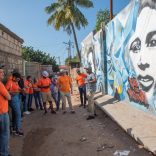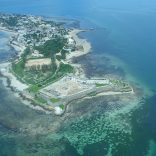BCI and Mafalala Museum: Walking through Mozambique's cultural heritage side-by-side
Mozambique: Migration explains why stand-up comedians were refused entry into the country – Watch

FILE - For illustration purposes only. [File photo: Notícias]
The director-general of Mozambique’s National Migration Service (SENAMI) justified today the refusal of entry to three stand-up comedians, an Angolan, a Brazilian and a Portuguese, on the grounds that they were attempting to enter the country with a tourist visa when in fact they intended to perform a show.
“They came to the country but did not meet the criteria for entry, because they came to put on a show – a cultural activity,” said Director-general Zainedine Danane, when questioned by Lusa on the sidelines of the event marking SENAMI’s 50th anniversary today in Maputo.
The official added that the group – Angolan Gilmário Vemba, Portuguese Hugo Sousa, Brazilian Murilo Couto, and a Portuguese producer of the show – arrived at Maputo International Airport on Sunday, intending to enter the country with a tourist visa, which is issued at the border following assessment by immigration agents, as required by Mozambican law since 2023.
However, the law excludes paid activities from this type of entry authorization, as was reportedly detected during the SENAMI inspection.
A source close to the event told Lusa that the “Tons de Comédia” show featuring the three stand-up comedians, scheduled for 5:00 PM on Sunday at the China Mozambique Cultural Centre in Maputo, was sold out.
“Unfortunately, we won’t be able to perform the show,” Gilmário Vemba said in a live broadcast on Instagram from the airport on Sunday night, explaining that the three had been waiting since 2:00 PM for entry into the country, and confirming the cancellation of the show and ticket refunds.
The group, according to the SENAMI general director, left the country this Monday morning on a TAP flight.
Zainedine Danane added that the promoter of the event in question should have “requested” a credential for the performance from the appropriate Mozambican authorities, which would later be used to apply for a cultural visa to enter the country.
“So, if you didn’t request this credential, it’s as if this activity didn’t exist. And how are you going to put on a performance if the people who should, perhaps, authorize it, don’t know about it? I’m referring to legal issues,” emphasized the director-general of Senami, citing the changes to the migration law for issuing visas for cultural activities made in 2022.
This accreditation, Danane said, would be the responsibility of the Mozambican Ministry of Culture.
Danane revealed that the Brazilian, Murilo Couto, had on June 15th submitted electronically an application for a business visa to enter Mozambique. Three days later, he was asked for missing documents, a request which went unanswered. Danane emphasized that, even if the visa had been granted, it would not allow him to enter the country to perform.
“The citizen didn’t meet the requirements, nor did he respond to the rejection, and he’s here in Mozambique, […] which has rules. There’s no country you enter without meeting the entry criteria,” he pointed out, assuring that there were no “administrative measures” in this case, only compliance with the law.
“There were no requirements for a business visa, a cultural activity visa, or a tourist visa. So, how were they going to enter the country? […] Everything is legal. There’s nothing we’re reinventing. The wheel has already been invented. You can consult the law,” said Zainedine Danane.
Gilmário Vemba had already performed solo in Mozambique in the past, without incident.
Dinis Tivane, an advisor to politician and former presidential candidate Venâncio Mondlane, who does not recognize the results of the October 9 general elections in Mozambique, stated early Sunday evening on his Facebook account that Gilmário Vemba was “prevented from entering Mozambique for expressing his opinions”.
On July 8, Venâncio Mondlane and Gilmário Vemba publicly shared a meeting in Lisbon, praising “Anamalala,” which in the Macua language, spoken in northern Mozambique, means “it’s over” or “it’s over” – an expression used by the politician during the campaign for the October 9, 2024, general elections and popularized in the protests he called in the following months—the acronym for the party he is trying to legalize – the National Alliance for a Free and Autonomous Mozambique (Anamalala).
Mozambique experienced a climate of intense social unrest following the October elections, with demonstrations and strikes called by Mondlane, who rejects the election results that gave victory to Daniel Chapo, supported by the ruling Frelimo party.
According to non-governmental organizations monitoring the electoral process, approximately 400 people died as a result of clashes with the police. These conflicts ended after a meeting between Mondlane and Chapo on March 23, repeated on May 20, aimed at pacifying the country.













Leave a Reply
Be the First to Comment!
You must be logged in to post a comment.
You must be logged in to post a comment.